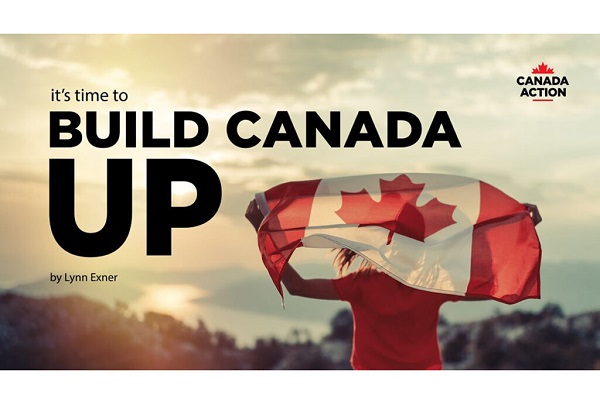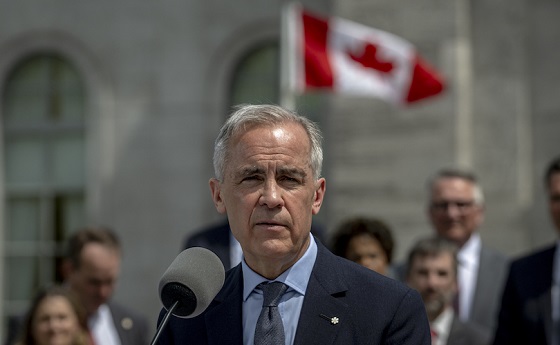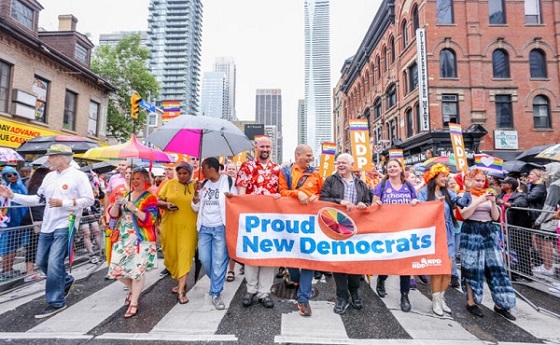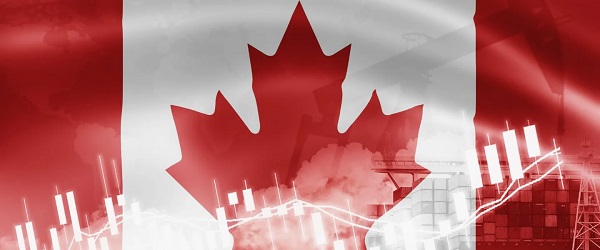Business
Canada: It’s Time to Stop Holding Ourselves Back – Lynn Exner

From Energy Now
By Lynn Exner
For decades, Canada’s provinces have behaved like crabs in a bucket—pulling each other down instead of lifting each other up. Instead of working together to build a stronger economy, we’ve allowed outdated trade barriers, regulatory red tape, and political infighting to stifle our own potential.

In my work advocating for Canadian resource development, I see it all the time. Canada has everything the world needs—energy, minerals, lumber, food, and more. But instead of ensuring our own domestic economy is strong and efficient, we’ve made it harder for businesses to grow, both within our borders and beyond them. Instead of celebrating and capitalizing on each other’s strengths, we have spent too much time competing internally, blocking opportunities, and making it difficult to trade internationally and within our own country.
That might have been tolerated in the past, when global trade was predictable and our largest trading partners were reliable. But the world has changed. Tariffs are being weaponized, supply chains are shifting, and countries everywhere are prioritizing their own industries.
If Canada wants to remain competitive, we need to start acting like a country—one with an internal economy that functions as smoothly as our external trade agreements.
The good news is that momentum is finally building to address this issue. Canada’s leaders are talking about dismantling interprovincial trade barriers—something that should have happened long ago. The challenge now is to make sure that this talk turns into action. It has been suggested it could take as little as 30 days. We can’t afford another decade of stalled negotiations, watered-down agreements, and excuses for inaction. It’s time to demand real change and hold our leaders accountable to follow through.

Every region of Canada produces something the rest of the country and the world need. Alberta’s oil and gas, Saskatchewan’s potash, Ontario’s manufacturing, Quebec’s hydroelectric power, British Columbia’s ports, and Atlantic Canada’s fisheries—these industries are the backbone of our economy. They should be supported, expanded, and celebrated. Instead, businesses and workers trying to move goods, services, and expertise across provincial lines face obstacles that weaken our ability to compete globally.
One of the most common-sense solutions is a National Energy and Resource Corridor—a dedicated infrastructure network that allows for the efficient transport of energy, minerals, and other critical resources across the country. Instead of every project facing jurisdictional battles and costly delays, a coordinated, pre-approved corridor would streamline trade and investment, ensuring that Canadian products reach both domestic and international markets without unnecessary obstacles. It would also provide a foundation for future development—whether in oil and gas, renewable energy, or critical minerals—giving businesses and investors the certainty they need to support long-term growth.
We see the need for this in our supply chains, where businesses deal with costly delays just trying to move products between provinces. We see it in our labour markets, where skilled workers face unnecessary barriers to working in other regions of the country. And we see it in national infrastructure projects that could benefit all Canadians but get tangled in red tape.

These inefficiencies cost our economy billions of dollars every year—money that should be driving investment, innovation, and job creation instead of being lost to unnecessary restrictions.
In normal times, this would be frustrating. In today’s economic and geopolitical climate, it’s reckless. The global marketplace is shifting, and Canada must be ready to meet the challenge. Instead of being held back by internal divisions, we need to work together to make Canada a stronger, more self-sufficient, and more competitive trading nation.
We’ve proven that cooperation is possible when it’s absolutely necessary. Now, we need to treat it as a permanent priority, not just a temporary fix during a crisis. This is not just about economic efficiency—it’s about Canada’s ability to stand strong in a changing world.
There is no reason why a Canadian business should have to navigate different rules and restrictions just to expand into another province. There is no reason why a worker should have to requalify to do the same job in a different part of the country. And there is certainly no reason why major projects that create jobs and economic growth should be stalled for years over jurisdictional disputes.
A crisis like this is a terrible thing to waste. The global economy is shifting, and Canada has a choice. We can cling to outdated provincial protectionism and regulatory inefficiencies, or we can remove these barriers and finally build a true national economy. We can keep acting like crabs in a bucket, pulling each other down, or we can recognize that our strength lies in working together. Instead of standing in each other’s way, we should be celebrating each other’s strengths and ensuring that every region of the country can contribute fully to our shared prosperity.
Canada has faced major challenges before, and we’ve always been at our best when we face them as a united country. Now, more than ever, we need to tap into that spirit—not just to fix today’s problems, but to prepare for whatever surprises the future holds. The time for provincial rivalries, excessive regulation, and economic inefficiency is over.
It’s time to break free from the bucket and move forward as a stronger, more competitive, and more resilient Canada.

Lynn Exner is a spokesperson for Canada Action, a volunteer-initiated grassroots group dedicated to promoting natural resource development and economic growth in Canada.
Business
Canada’s economic performance cratered after Ottawa pivoted to the ‘green’ economy

From the Fraser Institute
By Jason Clemens and Jake Fuss
There are ostensibly two approaches to economic growth from a government policy perspective. The first is to create the best environment possible for entrepreneurs, business owners and investors by ensuring effective government that only does what’s needed, maintains competitive taxes and reasonable regulations. It doesn’t try to pick winners and losers but rather introduces policies to create a positive environment for all businesses to succeed.
The alternative is for the government to take an active role in picking winners and losers through taxes, spending and regulations. The idea here is that a government can promote certain companies and industries (as part of a larger “industrial policy”) better than allowing the market—that is, individual entrepreneurs, businesses and investors—to make those decisions.
It’s never purely one or the other but governments tend to generally favour one approach. The Trudeau era represented a marked break from the consensus that existed for more than two decades prior. Trudeau’s Ottawa introduced a series of tax measures, spending initiatives and regulations to actively constrain the traditional energy sector while promoting what the government termed the “green” economy.
The scope and cost of the policies introduced to actively pick winners and losers is hard to imagine given its breadth. Direct spending on the “green” economy by the federal government increased from $600 million the year before Trudeau took office (2014/15) to $23.0 billion last year (2024/25).
Ottawa introduced regulations to make it harder to build traditional energy projects (Bill C-69), banned tankers carrying Canadian oil from the northwest coast of British Columbia (Bill C-48), proposed an emissions cap on the oil and gas sector, cancelled pipeline developments, mandated almost all new vehicles sold in Canada to be zero-emission by 2035, imposed new homebuilding regulations for energy efficiency, changed fuel standards, and the list goes on and on.
Despite the mountain of federal spending and regulations, which were augmented by additional spending and regulations by various provincial governments, the Canadian economy has not been transformed over the last decade, but we have suffered marked economic costs.
Consider the share of the total economy in 2014 linked with the “green” sector, a term used by Statistics Canada in its measurement of economic output, was 3.1 per cent. In 2023, the green economy represented 3.6 per cent of the Canadian economy, not even a full one-percentage point increase despite the spending and regulating.
And Ottawa’s initiatives did not deliver the green jobs promised. From 2014 to 2023, only 68,000 jobs were created in the entire green sector, and the sector now represents less than 2 per cent of total employment.
Canada’s economic performance cratered in line with this new approach to economic growth. Simply put, rather than delivering the promised prosperity, it delivered economic stagnation. Consider that Canadian living standards, as measured by per-person GDP, were lower as of the second quarter of 2025 compared to six years ago. In other words, we’re poorer today than we were six years ago. In contrast, U.S. per-person GDP grew by 11.0 per cent during the same period.
Median wages (midpoint where half of individuals earn more, and half earn less) in every Canadian province are now lower than comparable median wages in every U.S. state. Read that again—our richest provinces now have lower median wages than the poorest U.S. states.
A significant part of the explanation for Canada’s poor performance is the collapse of private business investment. Simply put, businesses didn’t invest much in Canada, particularly when compared to the United States, and this was all pre-Trump tariffs. Canada’s fundamentals and the general business environment were simply not conducive to private-sector investment.
These results stand in stark contrast to the prosperity enjoyed by Canadians during the Chrétien to Harper years when the focus wasn’t on Ottawa picking winners and losers but rather trying to establish the most competitive environment possible to attract and retain entrepreneurs, businesses, investors and high-skilled professionals. The policies that dominated this period are the antithesis of those in place now: balanced budgets, smaller but more effective government spending, lower and competitive taxes, and smart regulations.
As the Carney government prepares to present its first budget to the Canadian people, many questions remain about whether there will be a genuine break from the policies of the Trudeau government or whether it will simply be the same old same old but dressed up in new language and fancy terms. History clearly tells us that when governments try to pick winners and losers, the strategy doesn’t lead to prosperity but rather stagnation. Let’s all hope our new prime minister knows his history and has learned its lessons.
Business
Canadians paid $90 billion in government debt interest in 2024/25

From the Fraser Institute
By Jake Fuss, Tegan Hill and William Dunstan
Next week, the Carney government will table its long-awaited first budget. Earlier this year, Prime Minister Mark Carney launched a federal spending review to find $25 billion in savings by 2028. Even if the government meets this goal, it won’t be enough to eliminate the federal deficit—projected to reach as high as $92.2 billion in 2025/26—and start paying down debt. That means a substantial amount of taxpayer dollars will continue to flow towards federal debt interest payments, rather than programs and services or tax relief for Canadians.
When a government spends more than it raises in revenue and runs a budget deficit, it accumulates debt. As of 2024/25, the federal and provincial governments will have accumulated a total projected $2.3 trillion in combined net debt (total debt minus financial assets).
Of course, like households, governments must pay interest on their debt. According to our recent study, the provinces and federal government expect to spend a combined $92.5 billion on debt interest payments in 2024/25.
And like any government spending, taxpayers fund these debt interest payments. The difference is that instead of funding important programs, such as health care, these taxpayer dollars will finance government debt. This is the cost of deficit spending.
How much do Canadians pay each year in government debt interest costs? On a per-person basis, combined provincial and federal debt interest costs in 2024/25 are expected to range from $1,937 in Alberta to $3,432 in Newfoundland and Labrador. These figures represent provincial debt interest costs, plus the federal portion allocated to each province based on a five-year average (2020-2024) of their share of Canada’s population.
For perspective, it’s helpful to compare debt interest payments to other budget items. For instance, the federal government estimates that in 2024/25 it will spend more on debt interest costs ($53.8 billion) than on child-care benefits ($35.1 billion) or the Canada Health Transfer ($52.1 billion), which supports provincial health-care systems.
Provincial governments too spend more money on interest payments than on large programs. For example, in 2024/25, Ontario expects to spend more on debt interest payments ($15.2 billion) than on post-secondary education ($14.2 billion). That same year, British Columbia expects to spend more on debt interest payments ($4.4 billion) than on child welfare ($4.3 billion).
Unlike other forms of spending, governments cannot simply decide to spend less on debt interest payments in a given year. To lower their debt interest payments, governments must rein in spending and eliminate deficits so they can start to pay down debt.
Unfortunately, most governments in Canada are doing the opposite. All but one province (Saskatchewan) plans to run a deficit in 2025/26 while the federal deficit could exceed $90 billion.
To stop racking up debt, governments must balance their budgets. By spending less today, governments can ensure that a larger share of tax dollars go towards programs or tax relief to benefit Canadians rather than simply financing government debt.
-

 Alberta6 hours ago
Alberta6 hours agoFrom Underdog to Top Broodmare
-

 International17 hours ago
International17 hours agoPrince Andrew banished from the British monarchy
-

 Alberta2 days ago
Alberta2 days agoNobel Prize nods to Alberta innovation in carbon capture
-

 Business1 day ago
Business1 day agoCanada’s attack on religious charities makes no fiscal sense
-

 Business17 hours ago
Business17 hours ago“We have a deal”: Trump, Xi strike breakthrough on trade and fentanyl
-

 Crime17 hours ago
Crime17 hours agoCanada Seizes 4,300 Litres of Chinese Drug Precursors Amid Trump’s Tariff Pressure Over Fentanyl Flows
-

 National2 days ago
National2 days agoCanadian MPs order ethics investigation into Mark Carney’s corporate interests
-

 National2 days ago
National2 days agoCanada’s NDP is now calling women ‘non-males’













